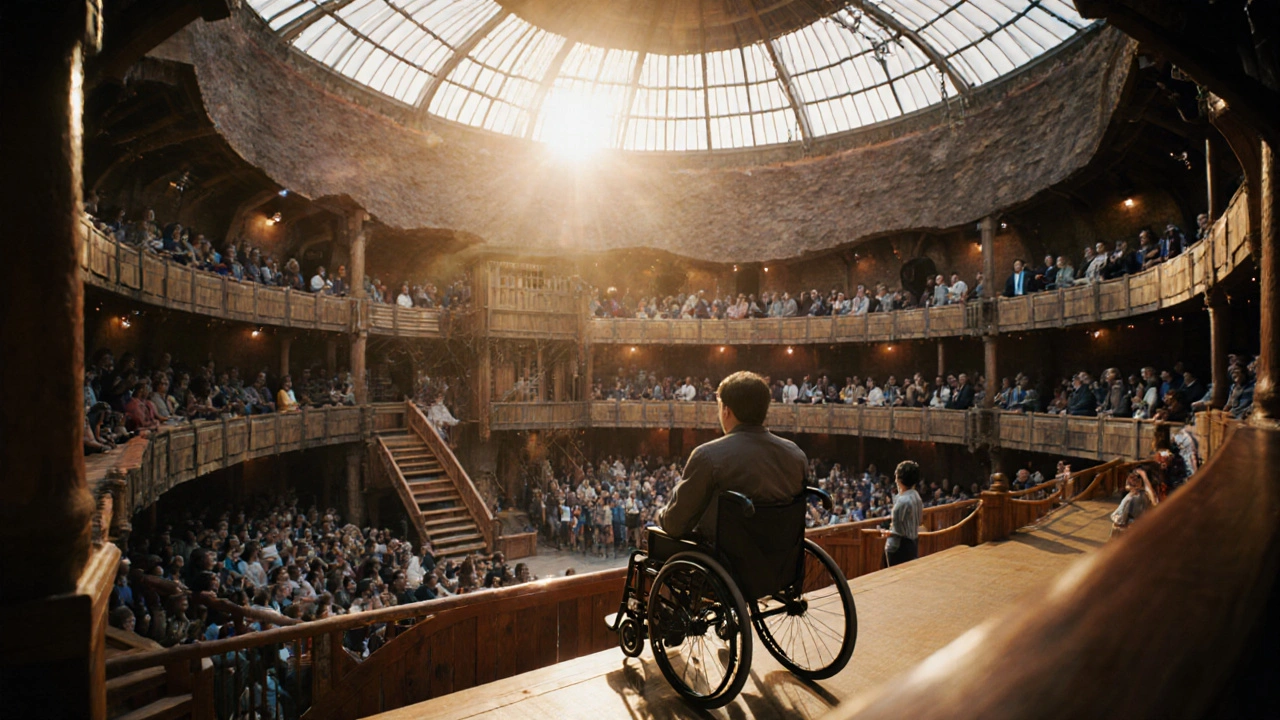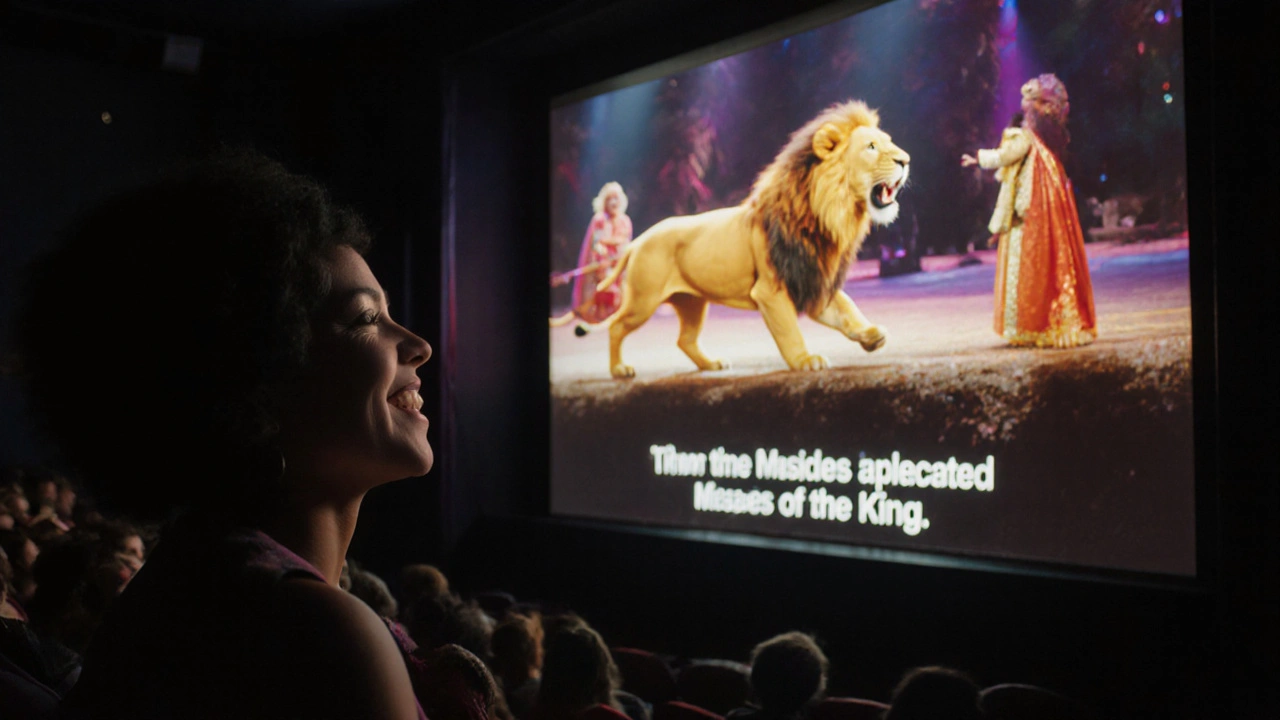
Going to the theatre in London shouldn’t depend on your mobility, hearing, or vision. Yet for years, many people with disabilities were left out of the magic of live performance-not because the shows weren’t great, but because the venues weren’t built for everyone. That’s changing. Today, London’s West End is leading the UK in accessible theatre, with most major venues offering clear wheelchair access, captioned performances, audio description, and relaxed shows. If you or someone you know uses a wheelchair, is deaf or hard of hearing, or has sensory sensitivities, you can now enjoy a full evening at the theatre without barriers.
Wheelchair Access in London’s West End Theatres
Every major West End theatre now has wheelchair-accessible seating, but not all are created equal. Some venues have just one or two spaces tucked in the back row. Others, like the Shakespeare’s Globe a reconstructed open-air theatre on the south bank of the Thames, with fully accessible ramps, lifts, and designated wheelchair spaces in all seating tiers, offer multiple accessible locations with unobstructed views. The Royal Opera House a historic venue in Covent Garden that provides step-free entry, accessible restrooms, and companion seating has 24 wheelchair spaces across its stalls, circle, and balcony, all with sightlines comparable to standard seats.
Booking is straightforward. Most theatres let you book accessible seats online through their own websites. Look for icons like a wheelchair symbol or filter options labeled “accessible seating.” If you’re unsure, call the box office directly. Staff are trained to help you pick the best spot based on your needs. Some theatres even offer pre-visit tours so you can check the route from entrance to seat, the height of the toilet, or the width of doorways.
Don’t assume a theatre is accessible just because it says so online. Always confirm the details. For example, the Theatre Royal Drury Lane one of London’s oldest theatres, with a historic structure that limits elevator access to the upper levels has step-free access to the stalls but requires stairs for the circle. They provide a lift to the upper foyer, but not to all seating areas. That’s why asking ahead matters.
Captioned Shows: Hearing What You Miss
Captioned performances are live theatre with real-time text displayed on a screen-usually near the stage or on the back of seats. These aren’t subtitles like you’d see on TV. They include dialogue, song lyrics, sound effects, and even cues like laughter or door slams. For someone who is deaf or hard of hearing, captions make the story fully accessible.
Most West End shows offer at least one captioned performance per week. Popular musicals like Les Misérables a long-running musical at the Sondheim Theatre with weekly captioned shows, The Lion King at the Lyceum Theatre, offering captioned performances every Wednesday evening, and Hamilton at the Victoria Palace Theatre, with captioned shows scheduled monthly all have regular captioned slots. The National Theatre a publicly funded venue that provides captioned performances for nearly all its productions leads the way with captions on every show, every week.
Captioning systems vary. Some theatres use a rear-window system-where text appears on a small screen mounted at the back of the auditorium. Others use personal devices like handheld screens or tablets you can hold on your lap. Ask when booking which system they use. Some people prefer the rear screen because it doesn’t block the stage. Others like personal devices because they can adjust the font size.
Audio Description and Relaxed Performances
For people who are blind or have low vision, audio description adds a live narration between lines of dialogue. A trained describer explains what’s happening on stage-costumes, movements, facial expressions-through a headset. Most major theatres offer this at least once a week. The Apollo Theatre offers weekly audio-described performances of its current productions, and the Duchess Theatre has a dedicated audio description schedule for all its shows.
Relaxed performances are designed for people with autism, dementia, or sensory processing differences. Lights stay on a little brighter, sound levels are lowered, and there’s no expectation to sit still or stay quiet. You can come and go as needed. Some theatres even have a quiet room outside the auditorium with soft lighting and calming tools. The King’s Cross Theatre pioneered relaxed performances in the West End and still leads in training staff has a full sensory guide online before each show, so you know exactly what to expect.

How to Book Accessible Seats and Shows
Booking isn’t always obvious. Here’s how to make it easy:
- Visit the theatre’s official website-not a third-party ticket site. Only the venue’s site lists accessible seating options and performance types.
- Look for the “Access” or “Accessibility” tab. It’s usually in the footer or under “Plan Your Visit.”
- Check the performance calendar for captioned, audio-described, or relaxed shows. These are clearly marked with icons.
- Call the box office if you have specific needs. They can tell you if a wheelchair space has armrests that lift, if the aisle is wide enough, or if there’s a hearing loop system.
- Book early. Accessible seats are limited, and they often sell out fast.
Some theatres, like the Criterion Theatre a smaller venue with a compact layout but excellent accessibility features, even offer a free companion ticket for carers. Always ask. Many venues now follow the UK’s Equality Act 2010 rules, which require them to make reasonable adjustments for disabled customers.
What’s Still Missing
Progress is real-but not perfect. Some older theatres still have narrow doorways or no accessible toilets on every level. A few venues still don’t offer captioning for every show, or only provide it on weekends. There’s no standard across all theatres. One venue might have a great hearing loop system, while another still relies on outdated equipment.
Also, information isn’t always easy to find. You might need to dig through multiple pages or call twice to confirm details. That shouldn’t be the case. The industry is moving toward a single, searchable database of accessible performances, but it’s not live yet. For now, ATG Tickets the largest theatre ticketing group in the UK, which operates over 20 West End venues and provides detailed accessibility filters on its site and Trafalgar Entertainment owner of the Lyceum, Apollo, and other major theatres, with a dedicated accessibility section on its website are the most reliable sources.

Real Experiences, Real Impact
One mother from Croydon told me she took her 12-year-old son, who is autistic, to a relaxed performance of The Sound of Music. He’d never sat still through a full show before. But in that audience, with the lights dimmed just a little and the music softened, he laughed at the von Trapp kids and clapped at the end. “He didn’t feel like he was being watched,” she said. “He felt like he belonged.”
That’s what accessibility means. It’s not about ramps and captions. It’s about dignity. It’s about knowing you can walk into a theatre, buy a ticket, and be treated like everyone else. No explanations. No apologies. Just a great night out.
What’s Coming Next
London’s theatre scene is pushing further. Several venues are testing real-time sign language interpretation for select performances. Others are experimenting with scent design-adding subtle smells to match scenes, like rain or flowers, to enhance immersion for people with visual impairments. The Barbican Centre a multidisciplinary arts venue that launched a pilot program for tactile tours before performances now offers touch tours where you can feel costumes, props, and set pieces before the show.
By 2026, all West End theatres are expected to have at least two accessible performances per week for every production. That’s not a dream-it’s a target set by the Society of London Theatre. And they’re on track.
Are all West End theatres wheelchair accessible?
Most are, but not all. Older theatres like the Theatre Royal Drury Lane have step-free access to the stalls but require stairs for upper levels. Always check the venue’s accessibility page or call ahead to confirm specific features like lifts, toilet access, and aisle width.
How do I find captioned theatre shows in London?
Visit the official website of the theatre you want to see. Look for an “Accessibility” section or filter for “captioned performances.” Major venues like the National Theatre, Royal Opera House, and Trafalgar Entertainment theatres list these clearly. You can also check ATG Tickets’ accessibility calendar.
Can I bring my own device for audio description?
Most theatres provide headsets for audio description, but you can bring your own if you prefer. Just let the box office know in advance so they can prepare the correct feed. Some venues also offer apps with audio description synced to the show.
Do I need to book accessible seats in advance?
Yes. Accessible seating is limited and often sells out quickly. Book as early as possible-especially for popular shows. Some theatres release accessible seats as soon as general tickets go on sale.
Is there a discount for carers or companions?
Many West End theatres offer a free or discounted companion ticket for people who need personal assistance. This applies to wheelchair users, those requiring audio description, or those with cognitive disabilities. Always ask when booking.
Final Thoughts
Theatre is about connection. Whether it’s a song that gives you chills, a line that makes you laugh, or a moment that brings you to tears-it matters. And it should matter to everyone. London’s West End isn’t just the heart of British theatre anymore. It’s becoming its most inclusive space. You don’t need to be a theatre expert to enjoy it. You just need to know where to look. And now, you do.